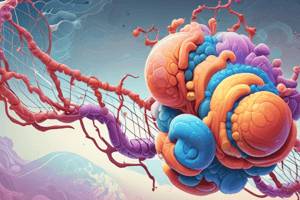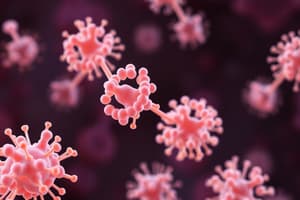Podcast
Questions and Answers
Where do ribosomes function in eukaryotes?
Where do ribosomes function in eukaryotes?
Cytoplasm
What are nuclear ribosomes?
What are nuclear ribosomes?
Ribosomes found within the nucleus
What types of ribosomes exist in nature?
What types of ribosomes exist in nature?
70S and 80S ribosomes
What is the difference between 70S and 80S ribosomes?
What is the difference between 70S and 80S ribosomes?
Where are ribosomes found in prokaryotes?
Where are ribosomes found in prokaryotes?
What are ribosomes the targets of in terms of antibiotics?
What are ribosomes the targets of in terms of antibiotics?
What are the two main subunits that compose ribosomes?
What are the two main subunits that compose ribosomes?
What is the function of the large ribosomal subunit?
What is the function of the large ribosomal subunit?
Describe the role of the small ribosomal subunit.
Describe the role of the small ribosomal subunit.
What are the three main stages of protein synthesis?
What are the three main stages of protein synthesis?
What is the genetic code of mRNA composed of?
What is the genetic code of mRNA composed of?
How does the ribosome bring the appropriate amino acid to the growing polypeptide chain?
How does the ribosome bring the appropriate amino acid to the growing polypeptide chain?
Flashcards are hidden until you start studying
Study Notes
Cellular Machinery: Understanding Ribosomes
At the heart of every living cell, tiny structures called ribosomes play a vital role in converting genetic information into functional proteins. Think of ribosomes as cellular factories, where the code of life is translated into the building blocks of life—proteins.
Components of Ribosomes
Ribosomes are composed of two main subunits, large (60S in eukaryotes, 50S in prokaryotes) and small (40S in eukaryotes, 30S in prokaryotes). These subunits are made up of ribosomal RNA (rRNA) and ribosomal proteins. The small subunit primarily decodes the messenger RNA (mRNA) while the large subunit catalyzes the bond formation between amino acids, ultimately creating proteins.
Ribosome Function
Protein synthesis, or translation, occurs in two main stages: initiation, where the ribosome attaches to the mRNA; elongation, where the ribosome adds amino acids to the growing polypeptide chain; and termination, where the ribosome releases the completed protein.
The ribosome reads the genetic code of mRNA, composed of three nucleotides called codons. Each codon corresponds to a specific amino acid, and the ribosome uses transfer RNA (tRNA) molecules to bring the appropriate amino acid to the growing polypeptide chain. The ribosome binds tRNA molecules at three sites: A (aminoacyl), P (peptidyl), and E (exit) sites.
Ribosome Location
In eukaryotes, ribosomes function in the cytoplasm, but they can also be found within the nucleus, where they are known as nuclear ribosomes. In prokaryotes, ribosomes are found in the cytoplasm.
Variations in Ribosomes
Two types of ribosomes exist in nature: 70S ribosomes (80S in eukaryotes) and 80S ribosomes (100S in eukaryotes). The difference between these two types lies in the number of ribosomal proteins and rRNA molecules. Prokaryotes have 70S ribosomes, while eukaryotes have 80S ribosomes. Additionally, prokaryotes have a single large subunit, while eukaryotes have two large subunits.
Ribosome Research and Applications
Ribosomes are the targets of several antibiotics, such as tetracycline and streptomycin, which inhibit the function of the ribosome in bacteria but not in humans. Researchers have also explored the use of ribosomes in protein production for biotechnological applications.
In conclusion, ribosomes are indispensable cellular structures responsible for protein synthesis, and their understanding forms a cornerstone in molecular and cellular biology. Their function, components, and locations serve as a testament to the complexity and intricacy of life's processes.
Studying That Suits You
Use AI to generate personalized quizzes and flashcards to suit your learning preferences.




